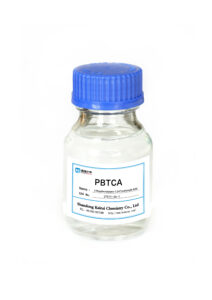PBTC (Phosphonobutane-1,2,4-Tricarboxylic Acid) is primarily known for its excellent scale inhibition properties rather than its corrosion inhibition effects. While PBTC can provide some level of corrosion inhibition, its main focus is on preventing scale formation and controlling the deposition of scale-forming minerals.
Scale inhibition: PBTC is highly effective in preventing the precipitation and formation of scale caused by minerals such as calcium, magnesium, and iron. It acts as a chelating agent, binding to metal ions and preventing them from forming insoluble scale deposits. This helps maintain the efficiency and performance of water systems, such as cooling towers, boilers, and pipelines.
Corrosion inhibition: Although PBTC does possess some inherent corrosion inhibition properties, they are generally considered moderate in comparison to other specialized corrosion inhibitors. PBTC can help reduce the corrosion rate of certain metals by forming protective film layers on their surfaces. However, for applications with significant corrosion concerns, additional corrosion inhibitors might be required in combination with PBTC to provide comprehensive protection.
It’s important to note that the effectiveness of PBTC’s corrosion inhibition and scale inhibition capabilities may vary depending on the specific water chemistry, system conditions, dosage, and other factors. Performing regular water analysis and consulting with water treatment experts can help determine the most suitable treatment approach and combinations of chemicals to achieve the desired levels of both corrosion and scale control.
